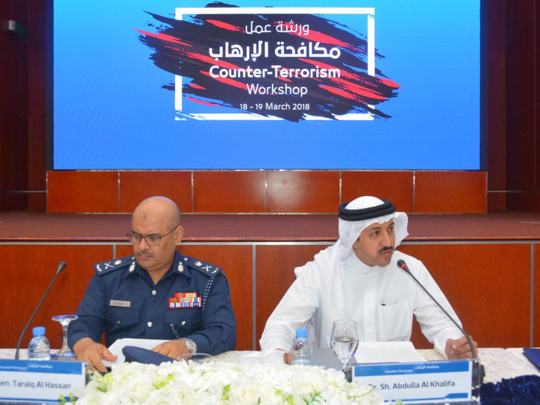
Manama: A Bahraini think-tank chairman has accused Iran of practicing “new-generation warfare” through establishing and supporting terrorist militias and parties to serve its interests.
Dr. Shaikh Abdullah Bin Ahmad Al Khalifa, Chairman of the Board of Trustees at the Bahrain Centre for Strategic, International and Energy Studies (Derasat) also accused Qatar of providing funds and shelter to terror groups.
“Iran is practicing state terrorism and is implementing plans to penetrate countries through its satellite terrorist militias and parties,” he said on Sunday as he opened a two-day workshop on countering terrorism.
He warned that despite successes in limiting the control by terrorist groups on geographical areas in some neighbouring countries, the radical theocratic thought is still present and expresses itself whenever it has the opportunity.
“This situation requires the prompt assessment of the measures to counter terrorism, especially that international efforts have not resulted in the complete elimination of that risk due to several fundamental issues,” Shaikh Abdullah said.
One major problem is the fact that the international community is not unanimous in its definition of terrorism and its classification of terror groups, which gives them the chance to sustain and to spread, he said.
“There is also the lack of far-reaching solutions that counter decisively each of the various stages of acts of terror, including the recruitment of terrorists, planning, funding and carrying out the attack. Each stage requires preventive strategies at all levels,” Shaikh Abdullah said.
“Another issue is that terror groups are not only Daesh and Al Qaida. The list should also include the groups that Iran supports through funding, training and arming, such as Al Houthis in Yemen, Hezbollah in Lebanon and the terror groups in Bahrain and some other Gulf countries.”
Shaikh Abdullah added that a major issue was not the inexistence of UN resolutions regarding terrorism.
“There are several resolutions that have called upon states to work together in order to counter the scourge of terrorism and its multiple threats. But the problem lies mainly with the implementation of the resolutions and the power to commit the member states to it.”
Until lasting solutions are found, terrorism remains the most important security challenge facing the countries of the region and the world due to human and material losses, the undermining of stability and development and the threats to national entities since terrorist groups embrace cross-border extremist ideologies and do not recognise national borders or the sovereignty of states, Shaikh Abdullah said.
According to Derasat, the workshop sessions and presentations by international experts aim to enrich the analytical and cognitive skills of counter-terrorism authorities.
They also address the ideological roots and technical aspects of the scourge as well as strategic thinking and policy planning to combat the threat of terrorism in the light of international conventions and practices.












